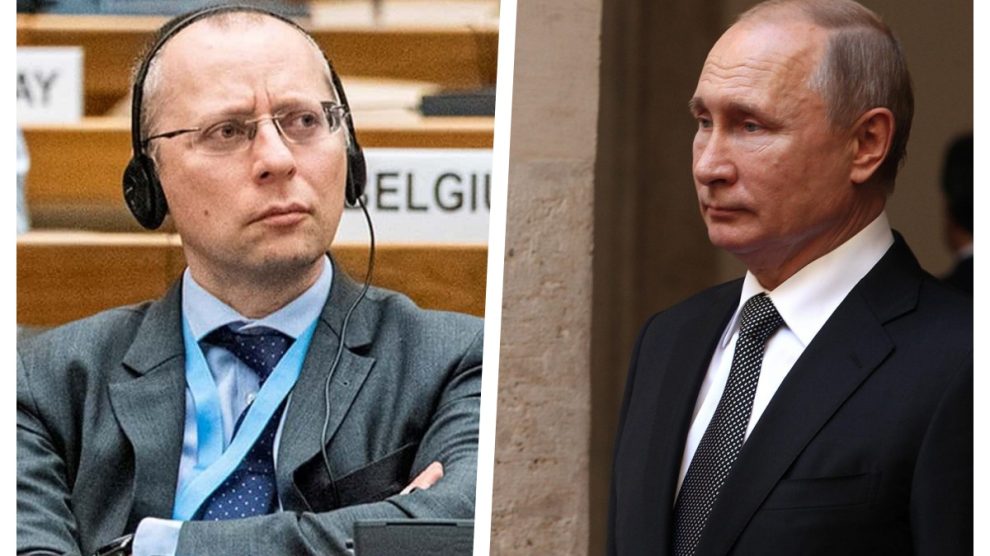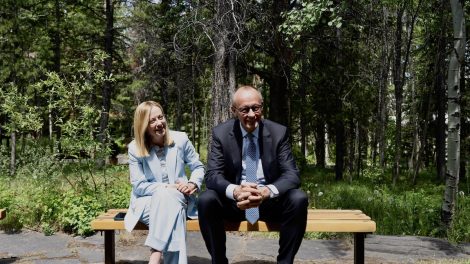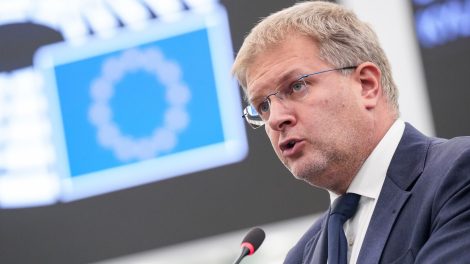“Are you afraid?” “No”. Boris Bondarev does not hesitate for a moment. His name means little to most – a Russian diplomat, like so many. Twenty years in the service of his homeland, a long career culminating in the Russian mission in Geneva, at the UN. But Boris Bondarev is not one of many. He is the first current Russian government official to have publicly condemned the invasion of Ukraine. He is the only one to have done so.
A month ago, Mr Bondarev penned an open letter and followed through with his immediate resignation; that letter was seen around the world. “I have never been ashamed of my country as I was on February 24 this year” is the opening line of a long j’accuse against Vladimir Putin and his system of power. So blunt, so unexpected that it left the Soviet palace in Smolenskaya Square, headquarters of Foreign Minister Sergey Lavrov, stunned into silence.
A month later, Mr Bondarev spoke to Decode39 in an exclusive interview. He answered from a hidden, safe place, which he cannot reveal for obvious reasons.
When exactly did you decide you had to write that letter?
It was obvious to me that quitting my job silently would not be enough to make a difference. If I had resigned without a word, it would have gone unnoticed, and I would have missed an opportunity to say what I had to say about what was going on. I knew that my letter would be circulated and many people would read it and realise that not all Russian civil servants are Putin’s accomplices in the war. So I decided to write the statement on that very day, February 24. It took some time and a few edits to accomplish.
Why was it unbearable for you to continue your public service in Russian diplomacy?
The situation had been worsening for a number of years, yet it was on February 24 that I realised that to stay any longer would be to betray myself. It would be against my principles. Russian public service now is filled with people who always say “yes” to their boss, whatever he says or does. They do not have their own opinion or do not show it. I don’t know what is worse. And since the war started, I witnessed so many shows of “loyalty” by my colleagues that it became really disgusting. You have to communicate, work and chat with people who discuss how they would nuke Washington, DC and all. And when I told them that the US would likely retaliate, my colleagues said “no, they will not. They will shit their pants and beg us for peace”. You can either go mad just like these guys or quit to preserve some mental sanity.
You said the invasion of Ukraine is “a crime” against Russia’s future. Could you explain why?
Firstly, it must be clear that 22 years of Putin’s rule were a totally wasted time for Russia. With an excellent situation in world markets, high prices on oil, gas and other export commodities and high authority among people in the 2000s, Vladimir Putin could have done almost everything. He could have used his power and authority to conduct long-awaited reforms and push the country further to economic development and build a democratic free society. He would have been remembered as a truly great leader and statesman, which he undoubtedly wants to be. Instead, he chose to build his personal dictatorship, so he and his friends could have billions of dollars, palaces, and yachts – all while suppressing opposition and depriving millions of people of hopes and prospects for a better future.
The situation today is different. The economy is going down. The people are becoming poorer; their prospects are fading. Putin’s support in society is not as solid and overwhelming as it used to be. Younger generations are not as fond of him. So now, to hold onto power, Putin has to destroy all who can resist. That’s why thousands of Russians are leaving their own country. They are the best of Russia – young, educated, professional, creative people. Without them, Putin can easily stay in power because he relies on most poor and ignorant social groups who are made so by his own policy and brainwashed by his own propaganda.
Putin is going to isolate Russia from the world, and that will make it even poorer and more underdeveloped. The war makes it even easier for him. That’s why I say that this war against Ukraine is a crime against the Russian future. And I didn’t even mention that our relations with Ukraine, one of our closest neighbours, have been absolutely lost for decades and generations. That is also a tragedy.
What happened after you decided to speak out? Were you aware of what would come after?
Well, as far as I know, nothing has happened. And I am very curious about what will happen next.
Are you afraid now?
No.
Is there any room left for dissent in Russian diplomacy and public service? How fast have things changed since the war started?
Frankly speaking, I don’t believe that many Russian diplomats are ready to stand up against the war. Some may quit quietly, some have already done so. But the majority is, as I said above, very servile. Some may hope to make a career. Many people have many reasons. Many prefer to blindly believe whatever they are told by the government. And, of course, a lot of them are afraid of possible repressions, whatever they may be.
Was there a watershed moment in your career when you realised Putin’s Russia was embarking on a journey of no return?
There were many moments when I realised that something, many things, were not right. But as it was all a sort of daily routine, it could be endured. At least I thought so. February 24 was the day I understood that there would be no turning back. For Putin’s Russia.
Are there any colleagues or public service officers sharing your same thoughts and feelings on the war?
A few, I suppose.
You entered Russian diplomacy over 20 years ago. How has it changed since Putin took office? And how has Russia’s foreign policy stance changed?
Well, I entered Russian diplomacy when Putin had already been President. But then our policies were different and aimed to develop good and beneficial cooperation with the West, above all. However, you cannot be treated as a European country if you build your own mafia state. Evidently, Putin imagined that his money would make him an equal to Western leaders while the nature of his power would always be neglected by them. His mistake. Now he and his “elite” are angry and offended. They think that the West hasn’t played “fair”. Funny that a cheat should feel insulted because nobody wants to play cards with him.
What kind of path is your country going to choose? How have the Russian society and political environment changed these last years?
Russia is going through a very humiliating time – one man makes decisions for the entire 140 million-strong country. And there’s no one there to say no to him. A few who can are either dead, jailed or exiled. So today my country cannot choose anything. Now it is very clear that the regime has evolved into a true fascist one. As such, it will become increasingly repressive inside the country and warmongering and aggressive outside. All we can do is hope that the situation will change. Of course, I would love to see Russia build a new, modern, free society where anyone has rights, and those rights are effectively protected. Very humble dream, don’t you think?
Do you believe Italy and other European countries are doing enough to prevent the war from continuing? What more could be done?
First, stop talking to Putin and calling him every day. Churchill didn’t call Hitler to tell him he was wrong about WWII. Second, realise that Putin’s regime is a major threat to global and European security. Don’t think that if he conquers Ukraine, he will be satisfied and stop. No.
The regime is losing ground. It is not as rock-solid as it may seem. Putin is not really enjoying wide support among the people. It may seem that way, but in fact, his true supporters – those willing to fight for him – are a minority. Very loud and foetid, though. Others are frightened – quite effectively, for now, I must admit – or they just don’t see anyone who could contest the incumbent President.
So, Putin needs victories to sell them to his supporters and his inner circle. One relatively small victory in the Donbas will not suffice because he initially promised to conquer the whole of Ukraine. He will need more and more “victories”. They may be Kyiv and all of Ukraine; then he may annex Belarus, then it may be Moldova or even the Baltic States. He can only sell military victories. Nothing else.
The war will not end while Putin is in power. So the only way to stop the war is to defeat Putin on the battlefield. Only a military defeat, a major one that cannot be concealed from the Russian public, will deliver a blow which will likely finish the dictator off. People will not like to see a loser in power. That’s the law of a pack of wolves, and that’s how Putin rules the country. I don’t exaggerate – it’s a mafia state as it is.
Facing a rather sad economic situation, tough sanctions and very dull prospects, any government after Putin will inevitably have to stop the war and negotiate peace, whether they will like it or not. Thus, Ukraine must get whatever supply and assistance it requires, whenever they are required. And those who come up with appeals like “let’s give Vladimir what he wants and stop the war” are really Putin’s allies, whether they realise it or not. Appeasement never works. It will only provide Russia with some time to replenish its resources and get ready for another campaign.
Russia may seem very strong, but it is weaker than it looks. It is not the USSR in any way. It is not a superpower. It only maintains great power status because of its enormous nuclear arsenal inherited from the USSR. Its economy is shrinking. Putin has the resources to wage war for some time but not for years. So the West must stay united and firm and shouldn’t try to trade its own security and Ukraine’s territories for some imaginary “peace,” which will soon turn into another bloody war.
The aggressor cannot be stopped by prayers and persuasions. He will understand only strength and resolve to fight him. So, in short, to support Ukraine means to continue the war. But if Ukraine falls, the war will not end. There will be new victims.
Do you have an appeal for your colleagues working in the public service?
I would urge them to start thinking for themselves, but they are all big boys and girls, so they should have understood it by now. I hope they do.





